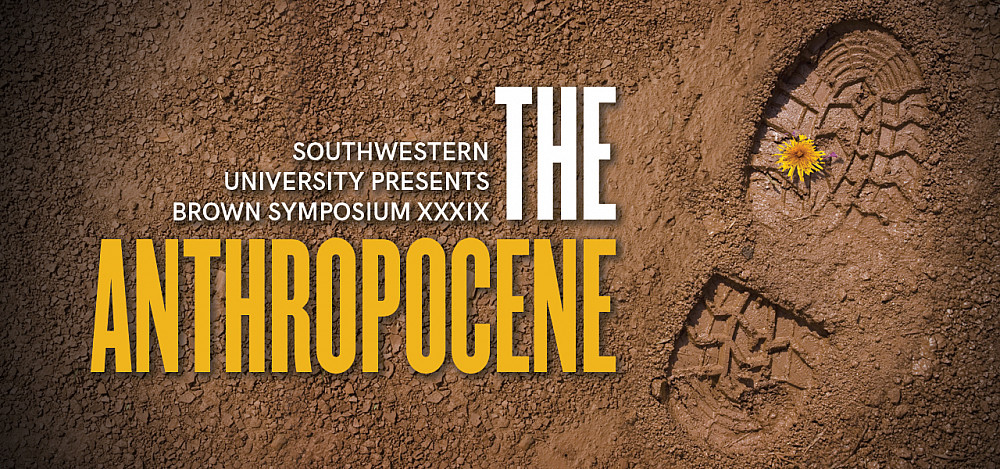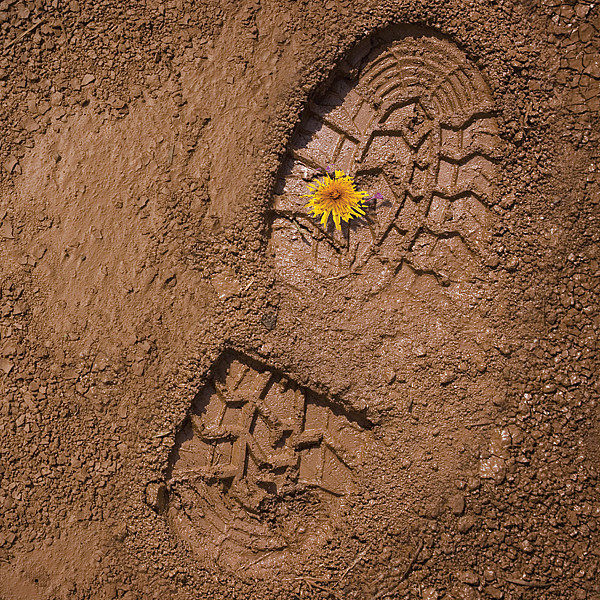News
The Human Impact on Earth
January 23, 2019
January 23, 2019

A new epoch(?)
The majority of human history is encompassed by the Holocene, the current geological epoch that stretches back nearly 11,700 years to the end of the last glacial period. In July 2018, the International Commission on Stratigraphy (ICS), the scientific organization that formally determines geologic time scales, announced that the Holocene era should be divided into three subepochs: the Greenlandian, the Northgrippian, and the current period, the Meghalayan (Gesundheit).
But these new designations were met with consternation, frustration, and even expletives on the part of geologists, biologists, environmentalists, sociologists, and other scholars throughout the disciplines and across the world. The reason for the backlash? Since 2000, many experts have followed Nobel Prize–winning Dutch chemist Paul Crutzen in arguing that humans have so significantly changed the Earth that the current epoch should be called the Anthropocene, from the Greek words anthropos ‘human’ and kainos ‘new’—namely, the Age of Humans. The ICS’s decision to subdivide the Holocene rather than to rename the epoch the Anthropocene caused some experts to worry that the committee was trivializing a crucial and widely agreed-on observation: that humans are the first species to have an impact on the entire planet through activities such as urbanization, industrialization, and overconsumption of natural resources, resulting in global and sometimes irreversible changes such as soil erosion, deforestation, sea-level rise, alteration of the chemical composition of the atmosphere, climate change, habitat loss, pollution of the air and oceans, species invasions, and species extinctions.
“In just the last four or five years, the whole idea has become much more popularized that humans are creating this new geologic epoch and we’re the only single species we know of that has ever changed the planet this much,” says Laura Hobgood, Southwestern professor of religion, cochair of the Environmental Studies Program, and Elizabeth Root Paden Chair in Religion and Environmental Studies. For example, the Anthropocene has been a hot topic not just in academic scholarship but also in environmental-justice activism and in the media; it has even been the focus of a children’s pop-up book. “A lot of people think that it’s just climate change, and that’s a big part of it, but I wanted to broaden the idea of what the Anthropocene really means—that it’s not just climate change [but] that it’s waste products, like plastic in the ocean; it’s justice issues; it’s food production.”
Empowering individuals and communities to do more
So Hobgood chose the Anthropocene as the topic for this year’s Brown Symposium XXXIX, taking place February 27–28, 2019, in the Alma Thomas Theatre at Southwestern. The biannual event, which is free and open to the public and is funded by The Brown Foundation, Inc., of Houston, features a slate of experts representing various disciplines who will present artwork, deliver lectures, lead Q&As on different aspects of the Anthropocene.
As coordinator of the symposium, Hobgood hopes that local community members, students, faculty, and staff attending the event will learn more about what the Anthropocene is but also come away with effective, accessible ways of making a positive difference. “Sometimes people think, ‘Well, OK, I’m recycling, I’m driving a high-fuel-efficiency car, I’m doing pretty much what I can,’” she says. “But they don’t feel very empowered on what they can do on an individual or small-community level, so I’m hoping some ideas are generated on those levels.” For example, guest speaker Carol Adams, author of Burger, The Sexual Politics of Meat, and Protest Kitchen, explores how the hamburger, that iconic American food, is a significant player in the Anthropocene because of its negative impacts on the environment and on human health. “People don’t necessarily think about how what they eat is a big part of the Anthropocene. But we’ve changed the face of the planet as much with monoculture and intensive factory farming as we have with the fuel products that are used for all that food production,” says Hobgood. By raising awareness about such issues, the symposium will inspire participants with concrete steps to implement at the individual and community levels so that they can feel like they “do have the power to do more than what they’re already doing.”
By raising awareness about such issues, the symposium will inspire participants with concrete steps to implement at the individual and community levels so that they can feel like they “do have the power to do more than what they’re already doing.
Discussions will also include aspects of environmental justice, including how individuals and communities of varying socioeconomic classes might be more or less restricted by their circumstances in how they can contribute to conservation or other environmentalist efforts.
The Anthropocene through different lenses
The fine arts will be just one of the many perspectives on the Anthropocene represented at the symposium. The event will open on Wednesday, February 27 with an art exhibition and gallery talk with guest artists. The exhibition, titled Listening to the Anthropocene, will be curated by Douglas Cushing, a PhD candidate in art history at the University of Texas at Austin. According to Cushing, the exhibition seeks to give objects, landscapes, and nonhuman living organisms voice in commenting on how “humans live in and with the world, transforming [it] in countless ways. Art, here, acts as mediator, translator, and teacher so that the world beyond us might be heard and full recognized.” To further the arts perspective on the Anthropocene, on Thursday, February 28, Southwestern Associate Professor of Music Bruce Cain, baritone, and Associate Professor and Chair of Music David Asbury, guitar, will perform an updated version of River of Words, a collaborative song cycle based on winning entries from the annual international art and poetry contest of the same name.
The art exhibition on Wednesday will be followed by a screening of the 2016 documentary A Plastic Ocean, in which journalist Craig Leeson and a group of divers and researchers explore how plastic pollution has resulted in the fragility of our oceans—and the solutions that can help save our open waters.
Thursday, February 28 will be packed with talks, Q&As, and performances led by Anthropocene experts in various fields. In addition to the aforementioned Carol Adams, who brings her groundbreaking ecofeminist perspective to the mix, the other guest speakers will include renowned journalist and author Andrew Revkin, who joined the National Geographic Society last March as their strategic advisor for environmental and science journalism. Revkin has been instrumental in educating audiences for the past 19 years about the Anthropocene, a word that, he has written, “has become the closest thing there is to common shorthand for this turbulent, momentous, unpredictable, hopeless, hopeful time—duration and scope still unknown.” Dr. Robert Bullard, Distinguished Professor of Urban Planning and Environmental Policy at Texas Southern University, has been called the father of environmental justice and has researched how disparities in racial and economic equality influence environmental and community health, susceptibility to disease, and the ability to recover after national disasters. Dr. Christopher Carter, an assistant professor of theology at the University of San Diego, specializes in philosophical, theological, and environmental ethics, including the challenges of bringing ecofriendly vegetarian and vegan diets to African American communities and how Christian theology can play a role in preventing black Americans from participating in the environmental movement. “All the speakers are wonderful,” Hobgood promises excitedly. “They’re all coming from different perspectives. And they’re great speakers in addition to having great topics.”
Leading by example
Hobgood is also excited that participants in the symposium will be able to implement some of the very practices that the speakers will be discussing. For example, because plastic waste is a major topic within research on the Anthropocene, this year’s Brown Symposium is “going to be plastic-free: no water bottles, no lanyards with name tags in plastic, and we’re going to encourage people to bring their own coffee mugs instead,” Hobgood says. She’s working with Sodexo, which is providing water cups that resemble plastic but are actually made of sugar and are biodegradable. Vegetarian and vegan meals and refreshments will also be on the menu during the event to encourage “a more sustainable way to eat.”
By encouraging the use of such biodegradable products and offering plant-based food options, Hobgood hopes to inspire great discussion and innovation within the Southwestern and larger Georgetown communities. The city has again garnered attention recently for its commitment to renewable energy, but with its rapid development, Hobgood would love for local citizens to also consider the environmental impacts of—and perhaps ecofriendlier alternatives of—waste disposal, food production, and building new houses, roads, and businesses in the area. She hopes the event will provide similar inspiration and enlightenment for Southwestern students, faculty, and staff. So the Anthropocene will be not just the theme of the symposium but also its catalyst for action on and beyond campus. “We need to think about how we can improve,” Hobgood says. “Even as an institution, we need to be thinking about how we might function differently, considering the environmental impact of Southwestern itself as being part of this shift.”
Brown Symposium XXXIX: The Anthropocene
February 27–28, 2019
Alma Thomas Theater, Southwestern University
This event is free and open to the public.
For more information, please contact Dr. Laura Hobgood at hobgood@southwestern.edu.















